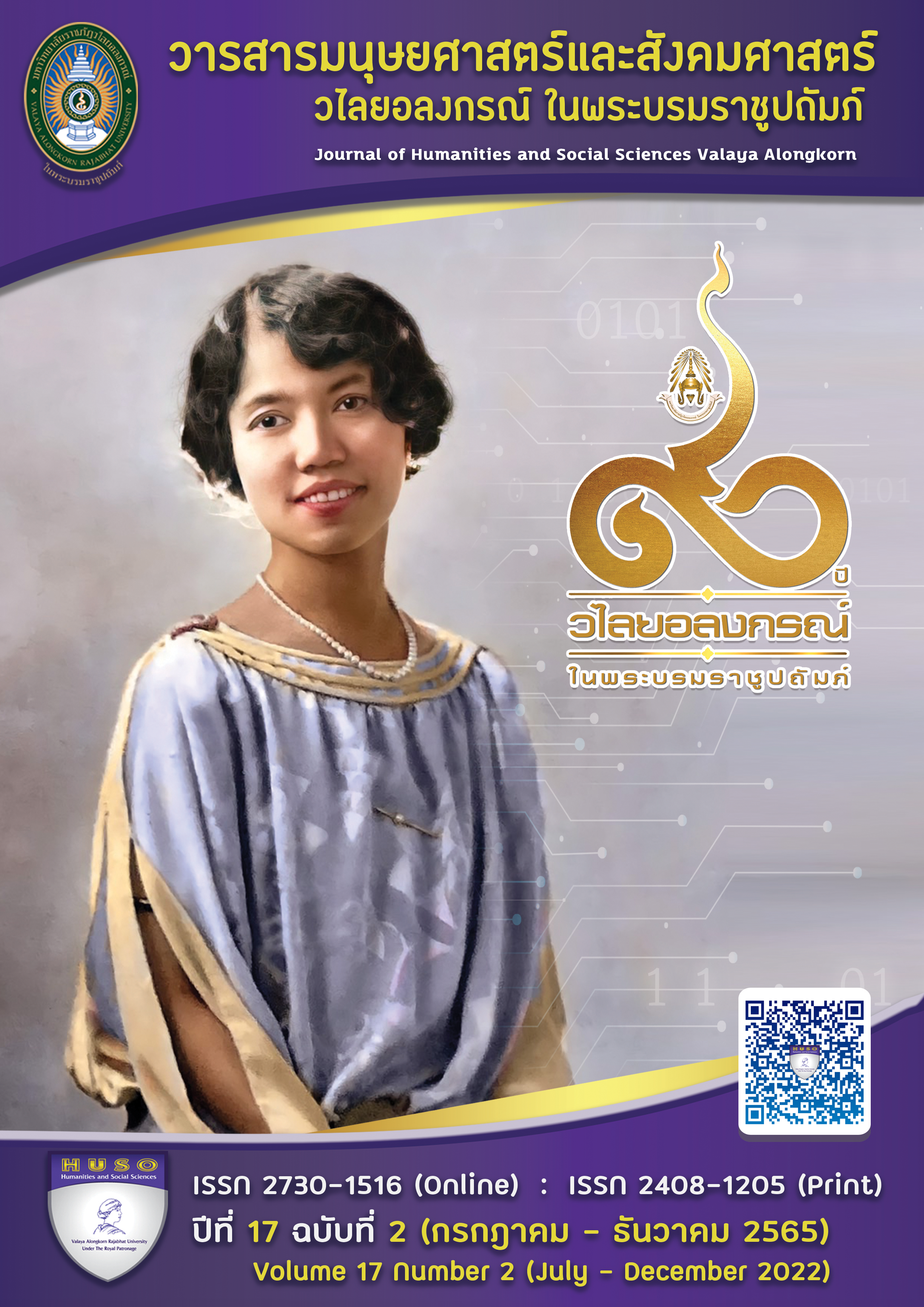THE CONSTITUTION AND THE DEVELOPMENT OF NATION-STATES
Main Article Content
Abstract
This academic article focuses on the origin and the development of the constitution from the past to the present by using the conceptual framework "Social Contract". Which is analyzed together with the development of the modern nation-state under the guidelines of the agreement in "The Treaty of Westphalia", where is the birth of the "Sovereignty". Furthermore, this led to a "Secular State form” (The Clear Separation Power between Politics and Religion). It was found that the "Constitution" was regularity, rules, regulations, and rules of society that the rulers had set up and enforced in different ways for a long time. Which has been developed continuously until became to distinctive style; as shown in the British “Magna Carta Charter” together with the creation of a written constitution after the founding of the United States. Later, this system became the mainstream values under the guideline "Constitutionalism" that spread widely, and it is also regarded as one of the important tools of the governance of modern nation-states around the world. Whether that, the government is in democracy, socialism, communism, authoritarian dictatorship, or any other form. In addition, the constitution provides administrative legitimacy and becomes part of the guarantee of territorial sovereignty for the rulers of international law. It is considered a compromise of political power which guarantees non-violent conflict. For examples, the case of the signing of documents by the British monarch which negotiates political power with the nobility in parliament. This is a characteristic of political reform that has resulted in the monarchy be able to maintain their status as the head of state for a long time until the present. Although the nature of the British Constitution is the unwritten law.
Article Details

This work is licensed under a Creative Commons Attribution-NonCommercial-NoDerivatives 4.0 International License.
ลิขสิทธิ์บทความวิจัยที่ได้รับการตีพิมพ์เผยแพร่ในวารสารมนุษยศาสตร์และสังคมศาสตร์ วไลยอลงกรณ์ ในพระบรมราชูปถัมภ์ ถือเป็นกรรมสิทธิ์ของคณะมนุษยศาสตร์และสังคมศาสตร์ มหาวิทยาลัยราชภัฏวไลยอลงกรณ์ ในพระบรมราชูปถัมภ์ ห้ามนำข้อความทั้งหมดหรือบางส่วนไปพิมพ์ซ้ำ เว้นแต่จะได้รับอนุญาตจากมหาวิทยาลัยเป็นลายลักษณ์อักษร
ความรับผิดชอบ เนื้อหาต้นฉบับที่ปรากฏในวารสารมนุษยศาสตร์และสังคมศาสตร์ วไลยอลงกรณ์ ในพระบรมราชูปถัมภ์ เป็นความรับผิดชอบของผู้นิพนธ์บทความหรือผู้เขียนเอง ทั้งนี้ไม่รวมความผิดพลาดอันเกิดจากเทคนิคการพิมพ์
References
ชาญชัย แสวงศักดิ์. (2560). กฎหมายรัฐธรรมนูญ : แนวคิดและประสบการณของต่างประเทศ. (พิมพ์ครั้งที่ 6). กรุงเทพมหานคร: วิญญูชน.
ชุติเดช เมธีชุติกุล. (2559). สนธิสัญญาสันติภาพเอาก์สบวร์ก, 1555: ความเสื่อมถอยของสังคมระหว่างประเทศในยุคคริสเตียน. วารสารประวัติศาสตร์ ธรรมศาสตร์, 3(2).
เชาวนะ ไตรมาศ. (2546). การใช้กลไกรัฐธรรมนูญสำหรับประชาชน. กรุงเทพมหานคร: สถาบันนโยบายศึกษา.
ไตรรงค์ สุวรรณคีรี. (2558). มารยาททางการเมืองกับกฎหมายรัฐธรรมนูญ. กรุงเทพมหานคร: โพสต์พับลิชชิง.
ทินพันธุ์ นาคะตะ. (2560). ปรัชญาการเมือง. (พิมพ์ครั้งที่ 2). กรุงเทพมหานคร: สำนักพิมพ์แห่งจุฬาลงกรณ์มหาวิทยาลัย.
ธิติ ไวกวี. (2562). หลักอธิปไตยเหนือดินแดนที่ไม่สอดคล้องในยุคแอนโทรโปซีน. วารสาร CMU Journal of Law and Social Sciences, 12(1).
บวรศักดิ์ อุวรรณโณ. (2554). คำอธิบายวิชากฎหมายรัฐธรรมนูญ. (พิมพ์ครั้งที่ 2). กรุงเทพมหานคร:
สำนักอบรมศึกษา กฎหมายแห่งเนติบัณฑิตยสภา.
บุญศรี มีวงศ์อุโฆษ. (2557). กฎหมายรัฐธรรมนูญ. (พิมพ์ครั้งที่ 8). กรุงเทพมหานคร: มหาวิทยาลัย ธรรมศาสตร์.
ปณิธัศร์ ปทุมวัฒน์. (2562). หลักสากลตามรัฐธรรมนูญแห่งราชอาณาจักรไทย พุทธศักราช ๒๕๖๐. จุลนิติ, (มีนาคม-เมษายน).
ยุทธศาสตร์ หน่อแก้ว. (2565). รัฐธรรมนูญกับการพัฒนาประชาธิปไตย. เชียงราย: สำนักวิชารัฐศาสตร์และ
รัฐประศาสนศาสตร์ มหาวิทยาลัยราชภัฏเชียงราย.
วทัญญู ใจบริสุทธิ์. (2552). ทฤษฎีอธิปไตยเหนือดินแดนอันจำกัดกับปัญหาข้ามพรมแดนสมัยใหม่ในกรณีโครงการเขื่อนบนแม่น้ำโขงของจีน. The Thai Journal of East Asian Studies (TJEAS), 14(2).
สมพงศ์ ชูมาก. (2551). ความสัมพันธ์ระหว่างประเทศยุคปัจจุบัน (ทศวรรษ 1990 สู่ทศวรรษแรกแห่งศตวรรษที่ 21). (พิมพ์ครั้งที่ 5). กรุงเทพมหานคร: สำนักพิมพ์ด่านสุทธาการพิมพ์.
Banting, K. G. & Simeon, R. (1985). Introduction: The Politics of Constitutional Change. In The Politics of Constitutional Change in Industrial Nations Redesigning the State, ed. Keith G. Banting, Richard Simeon. New York: Palgrave Macmillan.
Clark, I. (2005). Legitimacy in international society. Oxford: Oxford University Press.
Dicey, A. V. (1959). Introduction to the study of the Law of the Constitution (1885). London: Macmillan.
Dunne, T. (2013). “The english school”. In International relations theories: discipline and diversity, ed. Tim Dune, Milja Kurki and Steve Smith. Oxford: Oxford University Press.
Flemion, J. S. (1973). The Struggle for the Petition of Right in the House of Lords: The Study of an Opposition Party Victory. The Journal of Modern History, 45(2).
Kuokkanen, T. (2002). International Law and the Environment: Variations on a Theme. Alphen aan den Rijn: Kluwer Law International.
Lowndes. V. (2002) The Institutional Approach. In Theory and Method in Political Science. (3rd ed.). David Marsh and Gerry Stoker. New York: Palgrave Macmillan.
Schwoerer, L. G. (1990). Locke, Lockean Ideas, and the Glorious Revolution. Journal of the History of Ideas. 51(4).
Roskin, M., Cord, R., Medeiros, J & Jones, W. (1997). Political Science: An Introduction. New Jersey: Prentice-Hall International, Inc.


